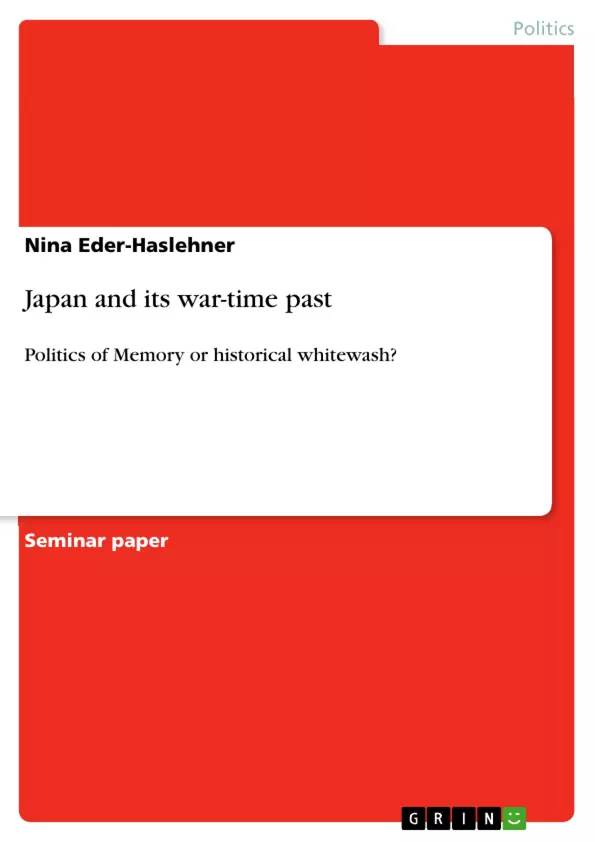“Remembering is never a quiet act of introspection or retrospection. It is a painful remembering, a putting together of the dismembered past to make sense of the trauma of the present.” Homi K. Bhabba (Y. Igarashi 3 2000)
When we observe Japan and how it deals with its history, the question occurs if Japan tries to whitewash its wartime past or if there are any other reasons behind is. The aim of this essay is to discuss this question. In the first part of it I will try to outline the known fact of the Japanese contribution on the World War II as a kind of approach to this sensitive topic. The second part will be dedicated to the role of the “International Military trial for the Far East” in the accounting of the wartime past within the Japanese society. The third part will deal with the sensitive issue of the so-called comfort women and how official Japan deals with this topic. The controversial topic of historical textbooks and how they try to show the role of Japan during the war will be the subject of the fourth part and in the last part I will discuss how the Japanese society in general sees the Second World War and the fact that executed war criminals are still worshiped by the Japanese community.
Inhaltsverzeichnis (Table of Contents)
- Introduction
- Japan and the Second World War
- The International Military Trial for the Far East
- The comfort women
- The history textbook issue
- The Japanese society and its dealings with the war time past
Zielsetzung und Themenschwerpunkte (Objectives and Key Themes)
This essay aims to discuss whether Japan attempts to whitewash its wartime past or if other factors contribute to its approach. It explores Japan's role in World War II, the International Military Trial for the Far East, the issue of comfort women, and the controversial topic of history textbooks. The essay aims to understand how Japanese society perceives the Second World War and its legacy.
- Japan's wartime actions and its role in World War II
- The International Military Trial for the Far East and its impact on Japanese society
- The controversial issue of comfort women and the Japanese government's response
- The role of historical textbooks in shaping public perception of Japan's wartime past
- Japanese society's overall view of the Second World War and the legacy of war criminals
Zusammenfassung der Kapitel (Chapter Summaries)
- Introduction: This section introduces the essay's central question: Does Japan try to whitewash its wartime past or are there other reasons behind its approach? It outlines the essay's structure, focusing on Japan's role in World War II, the International Military Trial for the Far East, the comfort women issue, history textbooks, and Japanese society's view of the Second World War.
- Japan and the Second World War: This section examines Japan's expansionist policies, its alliance with Nazi Germany, and the crimes committed by Japanese troops during the war, including the Nanjing Massacre. It highlights the impact of the atomic bombings of Hiroshima and Nagasaki and the subsequent US occupation of Japan.
- The International Military Trial for the Far East: This section explores the Tokyo Trial, a counterpart to the Nuremberg Tribunal, and its role in accounting for the wartime past within Japanese society. It examines the trial's strengths and weaknesses, including differing perspectives from the US, USSR, and China. The section also explores the public perception of the trial and various interpretations of its legitimacy.
- The comfort women: This section delves into the controversial issue of comfort women, forced to work in military brothels during World War II. It discusses the origin of these women, the history of comfort stations, and the number of women involved. The section also explores the Japanese government's response, including the Kono Statement and the establishment of a private fund for the victims.
Schlüsselwörter (Keywords)
Key terms and concepts explored in this essay include Japan's wartime actions, the International Military Trial for the Far East, the comfort women issue, historical textbooks, Japanese society's perception of the Second World War, whitewashing, war crimes, and the legacy of war criminals.
Frequently Asked Questions
How does Japan deal with its World War II history?
Japan's approach to its wartime past is complex, involving debates over whether the country is attempting to "whitewash" history or if other cultural factors influence its remembrance.
What was the International Military Trial for the Far East?
Also known as the Tokyo Trial, it was the Pacific counterpart to the Nuremberg Trials, aimed at prosecuting Japanese leaders for war crimes.
What is the 'comfort women' controversy?
It refers to women who were forced into sexual slavery by the Imperial Japanese Army during WWII, an issue that remains a sensitive diplomatic topic today.
Why are Japanese history textbooks controversial?
Critics argue that some Japanese textbooks downplay or omit wartime atrocities, such as the Nanjing Massacre, affecting how younger generations perceive the war.
What was the Kono Statement?
The Kono Statement was an official 1993 acknowledgement and apology by the Japanese government regarding the forced recruitment of comfort women.
How does modern Japanese society view executed war criminals?
The view is divided; while many acknowledge the crimes, some segments of society continue to worship or respect them at sites like the Yasukuni Shrine.
- Quote paper
- Nina Eder-Haslehner (Author), 2009, Japan and its war-time past, Munich, GRIN Verlag, https://www.grin.com/document/166334



